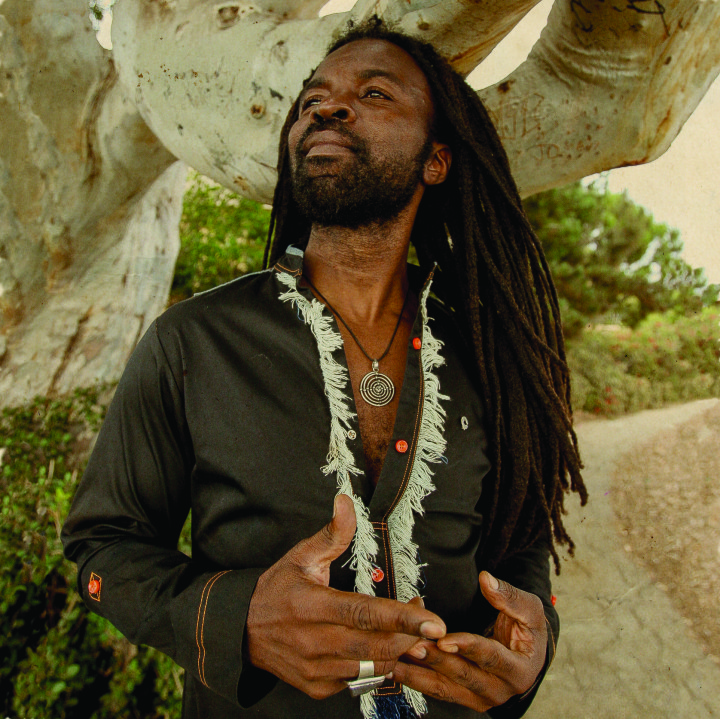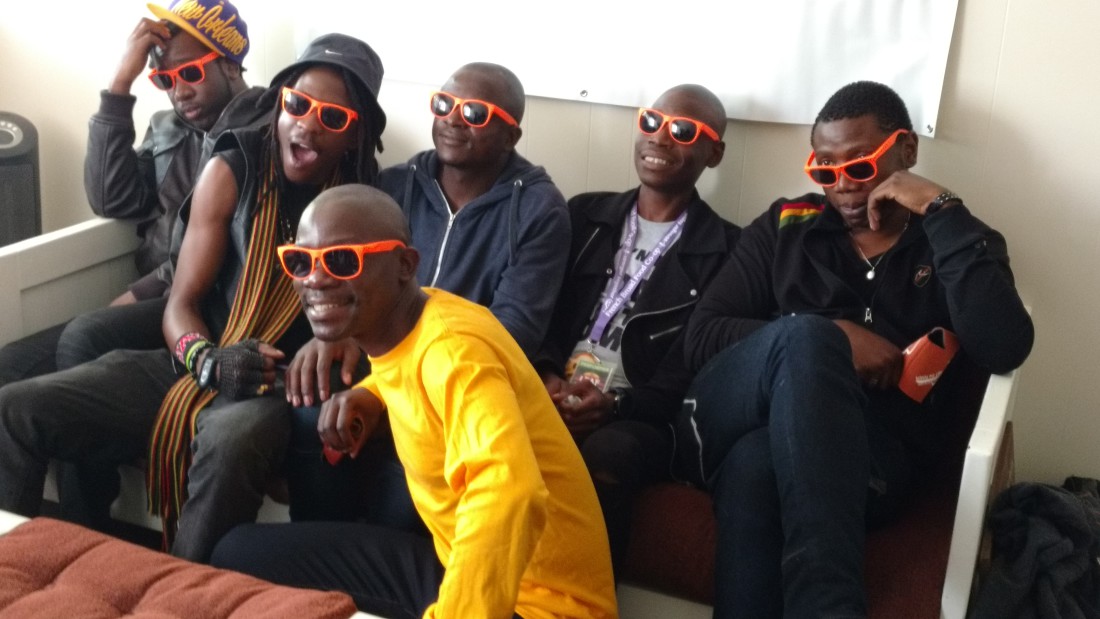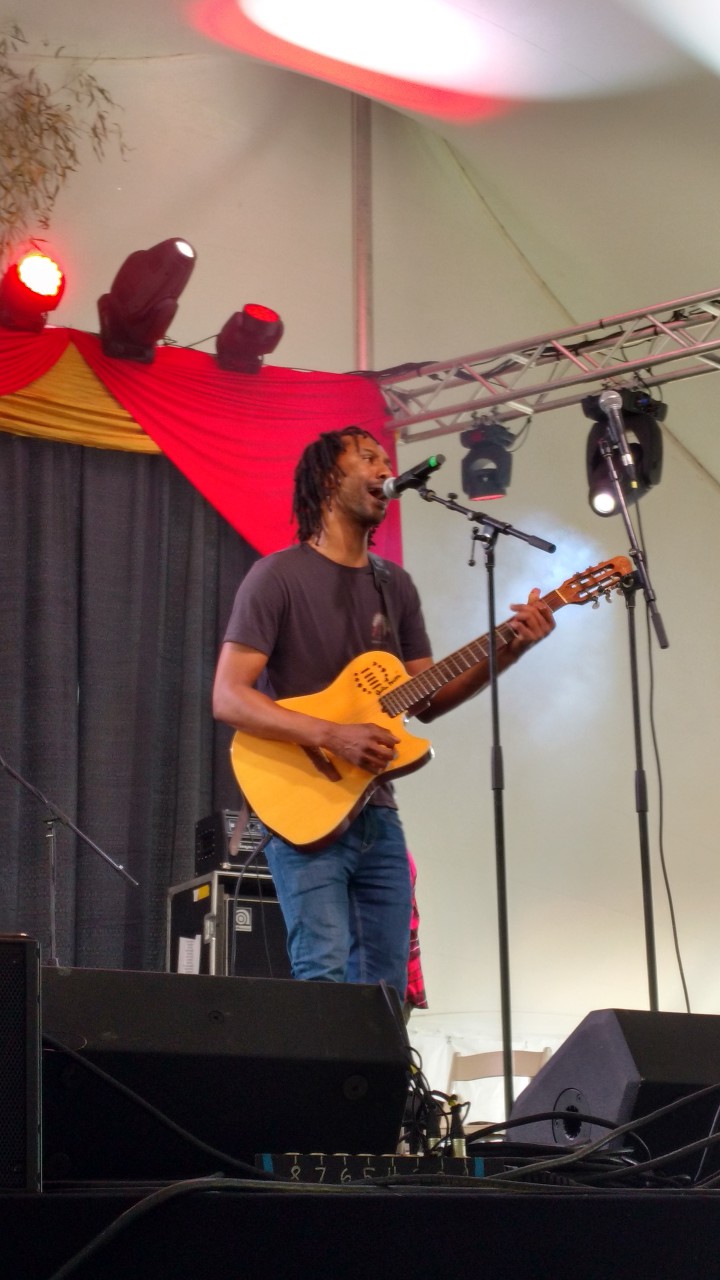LEAF festival, which celebrated its 44th iteration last weekend, positively buzzes with a spirit of participation — attendees who merely stand and listen to artists don’t experience half of what the event has to offer. From a zipline into Lake Eden to an instrument petting zoo; from the pitched boffer battles hosted by The Wandering Swordsmen to the all-day dance party inside the Brookside gym, LEAF is as much a place to celebrate life as it is to enjoy music.
The three “Legends of Africa” artists Mountain Xpress spoke with from this spring’s festival all drew on that participatory atmosphere during their weekend performances. Mokoomba, a Zimbabwean Afro-fusion outfit, brought onstage the students the musicians had mentored through the LEAF Schools and Streets program. Rocky Dawuni, a Ghanian reggae artist, led his packed Eden Hall assembly in a moving rendition of Bob Marley’s “Get Up, Stand Up,” while Mauritanian songwriter Daby Touré wove his Lakeside stage audience’s voices into the rich tapestry of his own vocals and looping guitar.
The following interviews highlight what these performers had to say about their work and their experience at LEAF. LEAF returns in the fall from Thursday, Oct. 19, through Sunday, Oct. 22.
—
Mokoomba
Xpress: You took part in the Visiting Teaching Artist residency program with LEAF Schools and Streets. Can you talk more about what you did with the kids?
Mokoomba: We have our own languages, which are not the main languages of Zimbabwe, that we sing in: Tonga, Nyanja and Luvale. So we were teaching the kids some songs from those languages, as well as dance moves from our culture. We also taught them how to play percussion in our tradition and some of our guitar playing. We don’t regularly get to do something like this, so it was a wonderful time to work together and share those musical elements.
Being from Victoria Falls, a big tourist destination in Zimbabwe, you were exposed to a lot of Western music. What artists did you listen to growing up that inspired your sound?

We used to play in a restaurant where tourists would come and have dinner, so we would play a bit of everything. We focused on the songs that they knew, the big hits, so we would listen to a lot of Jimi Hendrix, Carlos Santana and Elvis Presley. That has been helpful for us making music because we have all these influences that blend with our African styles.
That blend came through on your previous album, 2012’s Rising Tide. What new territory were you trying to explore on your current release, Luyando?
We’ve always used traditional styles and sounds, but our previous album was more Afro-fusion. We wanted the fans that have been with us and liking our music to really get more understanding of where we come from. So we made those traditional elements more visible on this album, using some of our acapella styles and the Zimbabwean marimba.
—
Rocky Dawuni
Xpress: What was your experience like in the Visiting Teaching Artist residency program with LEAF Schools and Streets?
Rocky Dawuni: I had just flown in from Zimbabwe after touring Africa — I was jet-lagged, but when I walked into Pisgah Elementary, I felt this tide of beautiful emotion and excitement. All the children were smiling, my music was playing and there were posters of me and my lyrics! It was a two-way street: Imparting your knowledge to the schools is a great means of paying it forward, but you also come to learn from the children and gain access to their lives and their reality. For me, that exchange is something every artist should experience, because it really brings home why we do what we do.
Many of the other “Legends of Africa” sing in their native or ancestral languages, while you sing primarily in English. Why make that choice?
I was always thinking globally. Ghana has over 70 tribal languages, so I wanted to use a medium by which I could communicate not only to my people, but also to the rest of the world. I have done one or two songs in local languages to really shed light on my culture, but I feel that my message has a universal dimension to it. English is the language of choice for that.
Reggae as a style can often feel grounded in the past, tied to the titanic legacy of Bob Marley. How do you keep innovating with your music, such as 2015’s Grammy-nominated Branches of the Same Tree?
I feel that integrating African and other world elements is a means to really advance the rhythmic integrity of reggae and progress the sound. When fusion is done in a way that is calculated, the audience can tell, but when fusion becomes an organic part of your evolution as an artist, people can relate to it. Wherever I travel, from Indonesia to China to Israel, I try hard to study the local music and become a fan of it. Then, as I write my own music, all these elements organically seep into my style and melodic perspective.
—
Daby Touré
Xpress: You played nearly all of parts yourself on your most recent album, 2015’s Amonafi, but you’re playing LEAF with a full band. How have you managed that change?
Daby Touré: It’s completely different working alone and being on stage with people. You’re in front of a crowd and telling a story, so you’ve got to open up more — it keeps you in a different vibe, with different emotions and energy. We play my songs, but we also improvise a lot on stage, and I really appreciate that freedom.
Your father was a musician himself, playing in the seminal Afro-fusion band Toure Kunda, but he discouraged you from music in your youth. Why do you think that was?
He’s an African dad, and he was really worrying about my future. He thought it would be better for me to study and get my diplomas, and then I could start making music — I told him I’d be 40 before I started playing! I wasn’t allowed to have any instruments at home, so I had to leave the house. Years later, when I was touring with Peter Gabriel, I invited him to the show. At the end of the performance, when I went out on stage, I saw him, and he was crying. It took me a long time, but I proved to him that this is what I wanted to live every day.
What have you never been asked in an interview that you wish someone would have?
No one has asked me about my religion, if I’m Muslim or Christian. My religion is about being a human being and trying to listen to what life is giving us, what nature is trying to tell us. It’s kind of like science in that respect. But I believe in a powerful energy that can help you, a strong feeling of justice and loving and the right thing.





Before you comment
The comments section is here to provide a platform for civil dialogue on the issues we face together as a local community. Xpress is committed to offering this platform for all voices, but when the tone of the discussion gets nasty or strays off topic, we believe many people choose not to participate. Xpress editors are determined to moderate comments to ensure a constructive interchange is maintained. All comments judged not to be in keeping with the spirit of civil discourse will be removed and repeat violators will be banned. See here for our terms of service. Thank you for being part of this effort to promote respectful discussion.